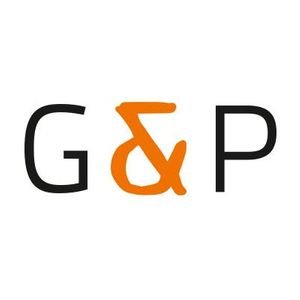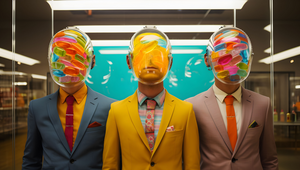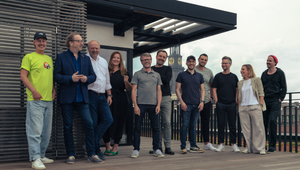
5 Minutes with… Ralf Heuel

Ralf Heuel was just a junior copywriter when he was invited by Andreas Grabarz to set up an agency in Hamburg. Andreas’ was Ralf’s head of creation at the Düsseldorf outpost of the Swedish agency Brindfors, but the Lowe network swooped in and acquired the agency with the hope of taking over its IKEA business. IKEA wasn’t so keen on that idea and proposed that Andreas should set up his own shop and service IKEA from there. And so Grabarz & Partner was born.
25 years later and Ralf is now the chief creative officer, a role he's been in since 2002, and IKEA is still a client– especially notable considering the fact that Germany is the home furnishing retailer’s most important and biggest market. For the past 15 years Grabarz has also boasted Volkswagen as a major client – they were the first independent agency to win a sizeable portion. And when you see their work, it’s of no surprise. Ralf and the rest of the Grabarz team have nurtured a culture that consistently puts out some of the most creative, moving, funny advertising not only in the German market but beyond.
How? LBB’s Addison Capper chatted with him to try and find out.
LBB> You co-founded Grabarz & Partner in 1993 when you were a junior copywriter, and at that time the agency was just five people. What are the first thoughts that come to your mind from that time?
RH> “Adventure”, “curiosity” and “nothing to lose”. Back then I worked as a junior copywriter for Andreas Grabarz in Düsseldorf at the Swedish agency Brindfors. Andreas was Head of Creation there. In 1993 Brindfors was suddenly bought out by the Lowe network – in the hope of also acquiring our main customer IKEA. But IKEA saw it differently and asked Andreas Grabarz whether he would consider starting his own business and taking the German IKEA account with him. And then Andreas asked me if I wanted to set up an agency with him in Hamburg – literally while we were on our way to the toilet. I'd always wanted to be in Hamburg anyway, so I said yes. Three weeks later, we were sitting in the removal van. It was a fantastic, exciting time. It was probably also very stressful, but you don't really remember that at my age.
LBB> What were your and the other partners’ main aims for the agency?
RH> Nowadays it's hard to imagine this happening, but we didn’t have any concrete objectives. No pinned-down business plan. No fully formulated manifesto. It wasn't about money either. What connected the five of us was that we wanted to do fantastic advertising for a fantastic brand. And prove to ourselves that we could do it our way. I wrote the invitation card for our opening party in Hamburg. It said: “1. We want to create amazing advertising. 2. We want to become famous. 3. We want to kick up our heels. (Okay, let’s start with number 3)”. The other thing that connected us was that we wanted to do brilliant advertising in a human environment. So not to motivate with fear, but with fun. And this aspect is what still connects the 300 people at Grabarz & Partner today.
LBB> I feel like Grabarz has an approach and tone of voice which feels quite daring and bold, standing out from the rest of the German industry, which can tend to be quite conservative. Would you agree with that? And if so, how do you cultivate that?
RH> Thanks for the compliment, I'm pleased to hear that. That’s not an easy question to answer. But I’ll try. There are two things that are decisive for our self-image as an agency, but they actually contradict each other: standstill and movement. Standing still refers to the values we have in our agency. How we work with each other, our view of the world, how we want to communicate with consumers, what brilliant advertising actually means to us, what moves people. We are very inflexible on these points, because it is the basis on which this agency has been built over the years and it’s what makes us what we are. It is our culture, the backbone of the company. This will always be the case as it guarantees consistency and quality, even if we grow bigger.
Movement applies to everything else we do. To the agency's muscles. We are an agency that loves to move, likes to question itself, likes to develop further, likes to provide impetus, that’s always hungry and brave and curious. For example, in our corporate communications department, we have a staff member who focuses only on our internal culture and who arranges incentives for our employees time and again – from band performances in our lounge to exchange programmes with other agencies, most recently in Sydney. Balancing these two elements of standstill and movement form the basis of the work we do outside. Only those who have a good internal culture can influence the culture outside the agency.
LBB> While we’re on the subject - what are your thoughts on the German industry in 2017?
RH> I currently feel 2017 is a relatively quiet year. I have not yet seen the great ideas, the big, surprising cases that everyone talks about and that move everyone. Maybe it’s just the calm before the storm.
LBB> The agency has been independent for its whole existence - how important has that been in cultivating the culture we were just speaking about?
RH> It is always fundamentally better to be independent than dependent – even if it's sometimes very uncomfortable, because you can't go running off to mum when things aren't going so well. The ability to make independent decisions on your own is definitely firmly anchored in our agency DNA. Of course, there have been and still are companies that want to buy us out. But as long as those of us managing the agency don't see any real benefit or vision that goes beyond purely monetary terms, we will remain independent. It’s worked well for the past 24 years.
LBB> IKEA has been a client of Grabarz’s for 25 years and you handle its communications for Germany, the brand’s most important market. Why do you think your relationship has been so fruitful?
RH> We are known for having very, very long relationships with both employees and customers. We're not a one-night stand. We have been working for Volkswagen for almost 15 years, for DEVK Versicherungen for 20 years and have many employees who have been with us for 10 or 15 years. I think it is because we have remained very constant in the management of the agency over the years. We don't have the kind of managers working as managing directors here who stay with us for three years and then move on to look for their next job. We are owner-managed. The owners of the agency work here everyday, and have done for many years. This has naturally led to customers and employees developing huge trust in the people who run this agency over the years.
LBB> How did you initially get into the industry? Was it a planned thing or more of a happy accident?
RH> It was both. I knew early on I wanted to work in advertising. I just didn’t know exactly what job I wanted to do. Where my talent lay. That's why I learned to be an advertising assistant first. Then, parallel to my national compulsory community service, I also studied marketing communication in Düsseldorf at night school. And one day I got hold of a copy of the book "One Show". There were such incredibly clever, canny, emotional, intelligent works in there – and that was the moment I knew I wanted to do something like this.
I still remember some of the ad motifs in that book today. One was for the Israeli airline “El Al”. A double-page spread, black and white, showing a sky through which a ray of sunlight was breaking. The headline was: “On the seventh day He rested. Guess where.” From that point on, I knew I wanted to do something like that. I wanted to be in creation. I then went on to do a trainee program with the ex-GGK copywriter Burkhard Apholz, from whom I learned a lot. Then I met Andreas Grabarz. I learned even more from him.
LBB> Due to you founding the agency quite early into your career, you must have been in more of a ‘creative guidance’ type role for a long time. So, what are your tricks for coaxing the best out of creatives and what’s the best way to approach saying ‘no’?
RH> The most important thing you need when working with creatives is trust. Both professional and human. The creatives have to get to know me and understand that I'm not an egomaniac arsehole. And then they need to be convinced that I can improve them, that I can make their work better – and not just “different” because I’m the boss. This trust is something that has to be earned everyday. I pay a lot of attention to a really well founded feedback culture. I want my creatives to learn and understand something from each decision, learn what makes an idea strong or weak, so they can understand why I say “no” to an idea. Only then will they improve and grow. Most of the feedback I give, by the way, is in writing so that it is not forgotten or watered down. I am now famous for my sticky notes in pdf documents.
LBB> If you had to pick two favourite pieces of work by Grabarz - one old and one newer - which would they be and why?
RH> That’s tough. Current favourites are probably the Volkswagen Arteon campaign ‘Blind Photographer’ and the ‘Mannschafts-Whopper’ for Burger King, both for the same reason: not only do they involve very good creation, but we as an agency have managed to make these works very big and visible for some major customers. To me, that's a major benchmark. An outstanding agency is more than just an outstanding creative department. If planning, consulting, creation and all the other trades have the same goal in common and work with all their heart and soul to achieve this, then I am satisfied.
I don't want to name older favourites. It's like having kids. If you have a lot of them, you don't want to give two of them special preference.
LBB> Outside of advertising what are you into? What recharges your creative batteries?
RH> Nothing exciting or particularly original, I'm afraid. No base jumping. No trash metal band project. No personal art gallery in a particularly rundown part of Hamburg. I like cooking. I’m interested in music and film. And I’m a total car nerd and own a couple of old sports cars with my partner Reinhard Patzschke. Let me drive through the countryside for a few hours in a 1970s 911 and I’ll feel like new.










